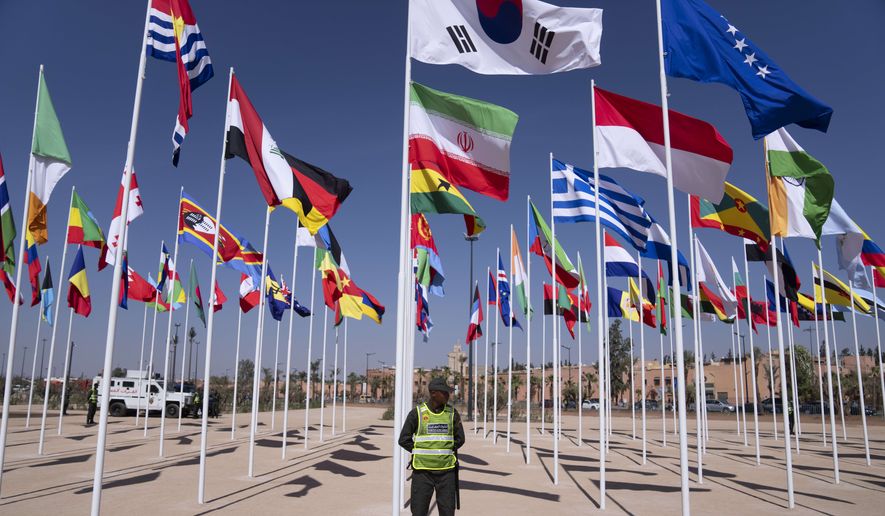The world economy has lost momentum from the impact of higher interest rates, the invasion of Ukraine and widening geopolitical rifts, and it now faces new uncertainty from the war between Israel and Hamas militants, the International Monetary Fund warned Tuesday.
The IMF said it expects global economic growth to slow to 2.9% in 2024 from an expected 3% this year. The forecast for next year is down a notch from the 3% it predicted back in July.
The deceleration comes at a time when the world has yet to fully mend from a devastating but short-lived COVID-19 recession in 2020 and now could see fallout from the Middle East conflict — particularly to oil prices.
A series of previous shocks, including the pandemic and Russia’s war in Ukraine, has slashed worldwide economic output by about $3.7 trillion over the past three years compared with pre-COVID trends.
“The global economy is limping along, not sprinting,” IMF chief economist Pierre-Olivier Gourinchas said at a news conference during the organization’s annual meeting in Marrakech, Morocco.
The IMF expectation of 3% growth this year is down from 3.5% in 2022 but unchanged from its July projections.
It’s “too early” to assess the impact on global economic growth from the days-old war between Israel and the militant Palestinian group Hamas in Gaza, Gourinchas said. He said the IMF was “monitoring the situation closely” and noted that oil prices have risen by about 4% in the past several days.
“We’ve seen that in previous crises and previous conflicts. And of course, this reflects the potential risk that there could be disruption either in production or transport of oil in the region,” he said.
If sustained, a 10% increase in oil prices would reduce global economic growth by 0.15% and increase global inflation by 0.4%, Gourinchas said.
“But again, I emphasize that it’s really too early to jump to any conclusion here,” he added.
So far, the increase in oil prices has been “fairly muted,” said Commerzbank commodities analyst Carsten Fritsch. He noted the absence of declarations of support for Hamas from key oil producers Saudi Arabia, the United Arab Emirates, Kuwait and Iraq, which would make it unlikely that they would restrict supply in response to the war.
So far, the world economy has displayed “remarkable resiliency,” Gourinchas said, at a time when the U.S. Federal Reserve and other central banks worldwide have aggressively raised interest rates to combat a resurgence in inflation.
The hikes have helped ease price pressures without putting many people out of work. That combination, he said, is “increasingly consistent” with a so-called soft landing — the idea that inflation can be contained without causing a recession.
The IMF sees global consumer price inflation dropping from 8.7% in 2022 to 6.9% this year and 5.8% in 2024.
The United States is a standout in the IMF’s latest World Economic Outlook, which was completed before the outbreak of war between Israel and Hamas. The IMF upgraded its forecast for U.S. growth this year to 2.1% (matching 2022) and 1.5% in 2024 (up sharply from the 1% it had predicted in July).
The U.S., an energy exporter, has not been hurt as much as countries in Europe and elsewhere by higher oil prices, which shot up after Russia invaded Ukraine last year and jumped more recently because of Saudi Arabia’s production cuts. And American consumers have been more willing than most to spend the savings they accumulated during the pandemic.
Things are gloomier in the 20 countries that share the euro currency and are more exposed to rising energy prices. The IMF downgraded eurozone growth to 0.7% this year and 1.2% in 2024. It actually expects the German economy to shrink by 0.5% this year before recovering to 0.9% growth next year.
That’s below even Russia’s economy, which the IMF predicts will expand 2.2% this year before dropping to 1.1% growth next year.
The Chinese economy, the world’s second-biggest, is forecast to grow 5% this year and 4.2% in 2024 — both downgrades from what the IMF expected in July.
China’s economy was expected to bounce back this year after the communist government ended draconian “zero-COVID” lockdowns that had crippled growth in 2022, but the country is struggling with troubles in its overbuilt housing market.
The IMF again expressed concern that the countries of the world were breaking into geopolitical blocs that could limit international trade and economic growth globally.
The United States and its allies have imposed unprecedented sanctions on Russia for its invasion of Ukraine and have sought to become less reliant on Chinese imports as tensions with Beijing grow.
The IMF noted that last year countries imposed nearly 3,000 new restrictions on trade, up from fewer than 1,000 in 2019. It sees international trade growing just 0.9% this year and 3.5% in 2024, down sharply from the 2000-2019 annual average of 4.9%.




Please read our comment policy before commenting.